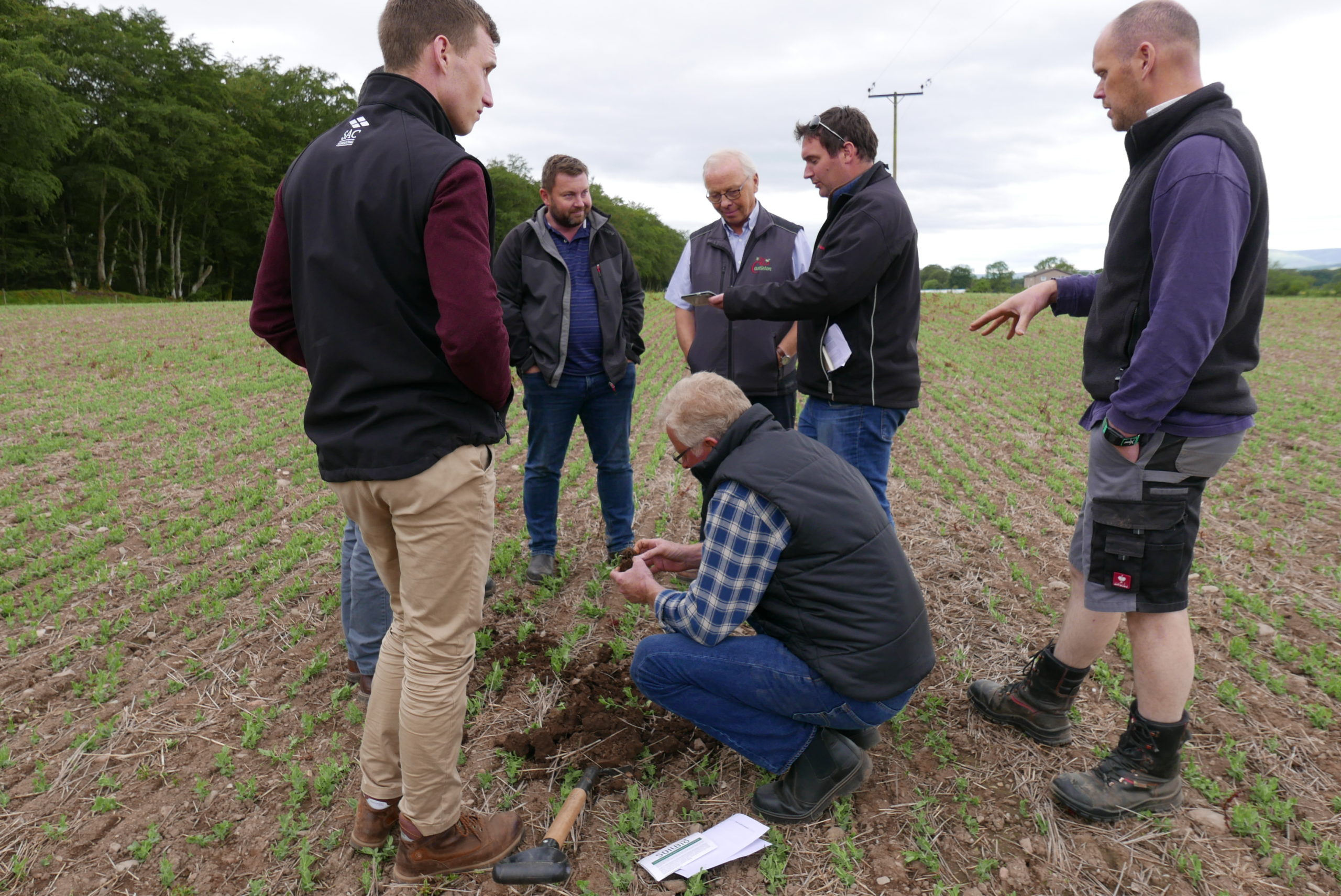Crop rotations have proved critical to improving soil structure and reducing weed burden for five northeast farmers, who have come to the end of a five-year knowledge exchange programme, looking at enhancing farm soils.
The Soil Regenerative Agriculture Group (SRAG) was launched in 2019 by the Farming For a Better Climate (FFBC) team, part of SAC Consulting, and brought together five farmers to explore a range of management techniques, treatments, crops, and rotations, to help build soil resilience.
The group, which consisted of Ross Mitchell, Douglas Ruxton, Ben Barron, James Hopkinson, and Hugh Black, focused their work around five core themes: minimising soil disturbance; providing constant soil cover; keeping a living root in the soil; integrating livestock and maximising crop diversity.
Although all five are at different stages in their regenerative farming journey, they all agreed that getting ‘back to the basics’ and focusing on good crop rotations was key to improving soil health and managing grass weeds.
Soft fruit grower Ross Mitchell, of Castleton Farm, in Aberdeenshire, joined SRAG at the beginning of his venture into regenerative farming.
“We decided five years ago to transition into the regenerative space and joining the group really aided our progression on that journey,” Ross explained. “A lot of people think it is about a machinery change policy or deciding not to plough, but really it is a mindset change.
“We have explored the five principles of regenerative farming as part of this process, we introduced a wider rotation mainly to help control grass weeds, introducing legumes as a break crop, mainly beans and some peas, which has added much needed diversity into the rotation. We also have embraced no-till and cover crops, which is helping with the structure of the soil, has reduced compaction and by not disturbing the soil, we are continually reducing our weed burden.
“We wouldn’t be doing this system if it wasn’t financially viable, it must stand on its own two feet and with the cost of fuel and machinery going up, we have found this is a far more resilient way of farming that reduces our inputs and costs.”
Cereal grower James Hopkinson, of Lindertis and Walker-Munro Farms in Angus, was already three years into his regenerative farming journey when he joined the group and his focus has been on improving soil health and reducing costs and tillage.
“It has been a really great process to go through as a group, as we are all trying to achieve similar goals but there is no blueprint which works for everyone,” said James.
“We are using every tool possible and pick drills and level of tillage appropriate to different parts of the farm, but the holy grail for us is direct drilling with a disc and we have had good results with certain crops in the autumn.
“We have been trying to find a balance in our rotation and we now split 50:50 between winter and spring crops, which allows us to better manage our weeds. Introducing new break crops such as beans have a big role to play in this along with growing and grazing over wintered cover crops. This aids soil restructuring, which helps us progress towards our ambition to use more root and less tillage in our system. We have also introduced legumes crops such as combinable beans and clovers and vetch in our covers to help increase fertility and nitrogen cycling and provide that all important feed for grazing livestock from November to March along with grazing early drilled winter crops such as wheat, oats and barley.”
The SRAG has come to a close but building on the strengths and success of the group and interest from farmers in the northeast, there are plans to create a larger discussion group of like-minded farmers who are equally looking to challenge the norm, reduce tillage and develop their own systems.
This new group will be part of the Farm Advisory Service (FAS) Connect programme and the five regenerative farmers have been asked to be involved to continue to share their experiences and working knowledge.
SAC Consulting’s Rebecca Audsley said: “We are really pleased to build on the legacy of the great work by the group and to be able to feed these learnings into FAS and share this knowledge more widely.
“The five farmers themselves are keen to continue to learn and the great thing about this whole process has been understanding the diversity of systems and approaches to regenerative farming and understanding there isn’t a one size fits all approach.”
For further information on SRAG, you can visit the FFBC website at https://www.farmingforabetterclimate.org or you can follow the project on Facebook and Twitter at @SACFarm4Climate.

